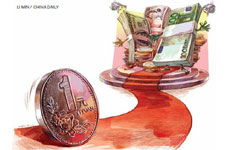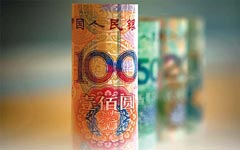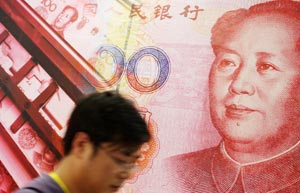The sharp depreciation of the yuan this week has aroused speculations that the currency's appreciation could slow or even be reversed.
Such anticipation is plausible, but given the interest rate differentials across the border and China's efforts to internationalize its currency, it may be too early to predict that its appreciation would come to a halt.
The yuan fell by 0.46 percent against the US dollar on Tuesday, the biggest fall since 2010. It has depreciated by 1.2 percent since the start of this year, compared with about 3 percent gain for the whole year of 2013.
Such a sharp fall has shocked the financial market and contributed to the domestic A-share market turbulence. On Tuesday, the benchmark Shanghai Composite Index tumbled by more than 2 percent. The weakening real estate sector, which is expected suffer from price cuts and tightened bank lending, is a main cause, but the investor uncertainty as a result of the yuan's unexpected depreciation is also an important factor behind the
stock market correction.
The depreciation will help stamp out international easy betting on the yuan, which has been risen steadily since 2010.
Also by the author:




